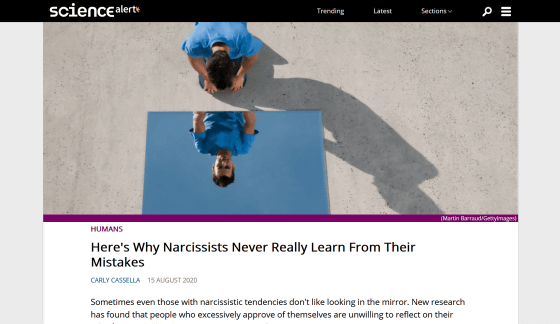Research shows that narcissists do not learn from past failures

A person who has strong
When and Why Narcissists Exhibit Greater Hindsight Bias and Less Perceived Learning-Satoris S. Howes, Edgar E. Kausel, Alexander T. Jackson, Jochen Reb, 2020
https://journals.sagepub.com/doi/10.1177/0149206320929421
Here's Why Narcissists Never Really Learn From Their Mistakes
https://www.sciencealert.com/there-sa-reason-why-narcissists-don-t-learn-from-their-mistakes

Hindsight bias is the tendency to think 'this was predictable' after something happened, and conversely to think 'this was unpredictable' after something happened. It is called hindsight bias. Research teams in the United States and Singapore conducted experiments using fictitious recruitment tests to investigate the relationship between narcissist trends and hindsight bias and vice versa.
First, the research team conducted a questionnaire survey of subjects collected online and analyzed narcissistic tendencies such as 'I am superior to others' and 'I think I am special'. Next, I gave the subject after answering the questionnaire an offer to participate as a recruiter in a fictitious recruitment test, pretending to be a different research from the questionnaire. By making the subjects think of each as a separate study, the results of the questionnaire survey were prevented from affecting the next experiment.
The participants who also participated in the experiment using the fictitious recruitment test read the information of the job applicants who applied for the fictitious job and decided who to recruit. The research team then told them how well the person they recruited was performing, and asked if the subject made the correct decision.
As a result of the experiment, it was found that a person who had a strong tendency to be a narcissist is unlikely to admit that 'I should have made another decision' even if my prediction was wrong. The exact reason for this trend is unknown, but it turns out that people with a strong tendency for narcissists do not learn from their predictions if they fail and are unlikely to improve their future judgments.

When things fail due to contingencies or unfortunate events, narcissists tend to complain, 'what could I have done in this situation?' 'No one could have expected this result!' Said the research team. This is because the people of the narcissist do not just admit their failure, but blame their failure on the 'unpredictability of the universe.'
'The narcissists have a strong tendency to self-praise and self-defense, so they show a strong hindsight bias when the prediction is correct, and an opposite hindsight bias when the prediction fails. Each of these trends negatively impacts learning and future decision making.'
As a case where the hindsight bias and the reverse hindsight bias actually worked strongly, the research team gave the example of US President Donald Trump. While President Trump argued that he 'predicted the outcome of the Iraq war more accurately than anyone ', he withdrew from the alternative bill 'American Health Care Act' that was submitted to eliminate Obamacare. 'No one could have predicted that the healthcare issues were so complicated,' he said.
Regarding the global financial crisis that stemmed from the Lehman shock , Wall Street bankers argued that 'it was impossible to predict a financial crisis.' However, the Financial Crisis Research Committee, which was formed later, said, 'This financial crisis was predictable in advance.' Bankers said they were trying to use the opposite hindsight bias and did not try to learn from their mistakes.

Truncating failures as unpredictable will result in no lessons learned and failure to improve future decision-making processes. On the other hand, it is also true that you can avoid denying yourself and feeling stressed by thinking that 'I was not bad' and 'it was a helpless event.' The research team argued that this self-defensive reverse hindsight bias could result in narcissists being happier and less stressful than the general population .
Related Posts:
in Note, Posted by log1h_ik







